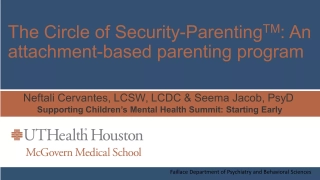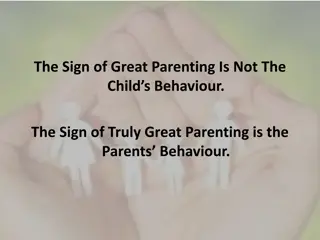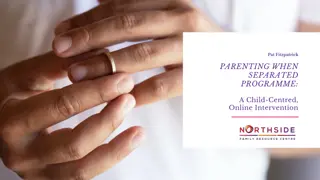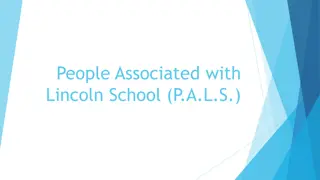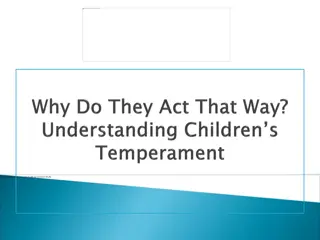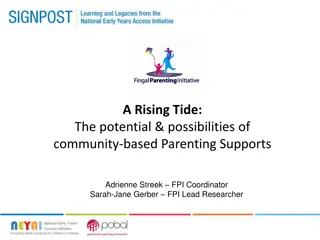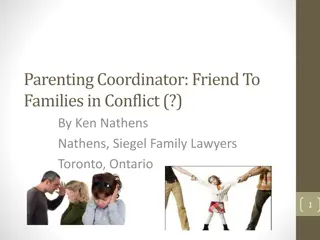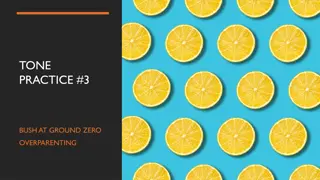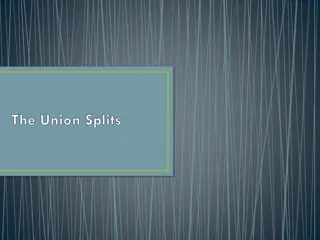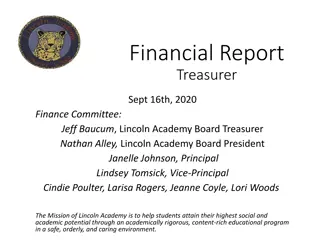Lincoln's Challenge Academy Parent Orientation: Building Positive Parenting Skills
Parent Orientation at Lincoln's Challenge Academy focuses on enhancing parenting skills to discipline and motivate teenagers effectively. By fostering positive communication and relationships, parents can guide their teens towards self-discipline and success. The program helps families address challenges such as behavior issues, lack of motivation, and communication gaps, aiming to strengthen family bonds and support teens' growth towards becoming responsible individuals.
Uploaded on Oct 04, 2024 | 6 Views
Download Presentation

Please find below an Image/Link to download the presentation.
The content on the website is provided AS IS for your information and personal use only. It may not be sold, licensed, or shared on other websites without obtaining consent from the author.If you encounter any issues during the download, it is possible that the publisher has removed the file from their server.
You are allowed to download the files provided on this website for personal or commercial use, subject to the condition that they are used lawfully. All files are the property of their respective owners.
The content on the website is provided AS IS for your information and personal use only. It may not be sold, licensed, or shared on other websites without obtaining consent from the author.
E N D
Presentation Transcript
Lincolns Challenge Academy Parent Orientation ARE YOU UP FOR THE CHALLENGE
Welcome to Parent Orientation Welcome to Lincoln s Challenge Parent orientation. In this orientation we will address ways to build parenting skills that will help you, the parent discipline your teens as well as encourage them in order to help them feel positive about themselves and to become the winners they were meant to be. We want to provide tips for improving communication, building positive relationships and other useful parenting skills. The goal of parenting is to teach kids to develop self-discipline. When parents learn and apply these skills they find that a positive relationship is established.
So, Why LCA?? From our experience families choose Lincoln s Challenge because: Something at home wasn t working out. Teens having trouble in school Behavior issues at home Lack of motivation/discipline You may need help Getting the teen back on track educationally Learning how to keep them motivated Something was broken Communication between you and the teen Family bonding
The Foundation is Being Laid Your teens have taken the first step to Change by choosing to come to LCA. The mere fact that they are still in the program shows their dedication to change. Skills you child is learning here at LCA: Structure/discipline/responsibility/accountability Rules and consequences Consistent -They know what to expect daily Equal/Firm/Consistent- This is how LCA molds them Influence-setting the example, we lead how we want them to follow
The Bottom Line of Adolescence Driving fast, breaking curfew, arguing, shoplifting. Teenagers can push your patience, and unfortunately, some kids go as far as blatantly breaking the law or rules, often with tragic results. What's with this rebellious streak? All teens go through similar phases -- the need for independence, a separate identity, testing authority. It's part of growing up; it's also linked to developmental changes in the brain that will eventually help them become analytical adults. During the teenage years, the area of the brain called the prefrontal cortex is developing. It's your thinking cap and judgment center. As a child evolves into a teenager, the brain becomes able to synthesize information into ideas. Teens want to exercise their new skill -- and they tend to practice on their parents. Dr. David Elkind holds a PhD and is a professor of child development says It may seem that they argue for the sake of arguing. But really, they're practicing their new abilities. So, our jobs as parents is to guide them through life s phases and hold them accountable for their choices.
Influence -vs- Control As a parent, the distinction of control vs. influence is an important one to consider. Which is better? The answer is probably it depends, however, when it come to your child, influence has shown to be so much more effective. Control Influence Empathetic Gives teens a choice Allows teens to learn from mistakes Positive re-enforcement Punishing Harsh talk/actions Demanding Negative re-enforcement
Perception Matters Perceptions do matter. The way we appear to others can affect how they in turn react to us, and the degree of confidence or comfort they have in dealing with us. Please understand that your children can pick up on your attitudes towards them.
Setting Family Rules Why are family rules important? Family rules help children understand what behaviors are okay and not okay. As teens grow, they will be in places where they have to follow rules. Following rules at home can help them learn to follow rules in other places. As parents we must: Be the role model for our teens Everyone must abide by the rules, even you, as a parent Fewer, but clear rules are best
Importance of Consequences Using consequences helps you to impose discipline in a way that teaches your teen responsibility and accountability and encourages them to look inward to learn how they can do things differently in the future. Use consequences to Build Self- Esteem, Maintain Connections, and Build Character. Consequences are both good and bad, and there are three types of consequences. Natural Consequences This happens automatically without any action on your part. For example, if your teen does not wear a rain coat on a rainy day, he will get wet. If she forgets her lunch, she will be hungry. Logical-Related Consequences This is where you step in. For example, if your teen won t dress properly for the weather, she may not be allowed to go out. Imposed-Not Related Consequences For example, perhaps your teen didn t clean, but also has a negative attitude about it and this has been a recurring problem. You are frustrated and not sure what to do. At this point, all privileges are suspended. Suspension of privileges is different from taking privileges away it implies that the teen will have some power in getting the privileges reinstated. Obligations vs. Privileges Parental obligations are what you absolutely must give your children, such as basic nutritious food, proper medical care, school attendance, and respect. Privileges are what you choose to give to your children, such as special foods that meet their preferences, outings, sports, and activities.
Tips on Enforcing the Rule Ensure the rules and consequences are clearly communicated and understood before you enforce them. Be practical with consequences- Make sure they are relevant to the rules. Be consistent in applying consequences. Listen to their concerns, don t argue about the rules or consequences and adjust them where and if you feel necessary, to make them more effective.
Choosing Consequences Privilege = Motivation Making effective consequences will assist with compliance. In order to do that you must understand what motivates/interest your teen. Examples: Phones Spending time w/ opposite sex Friends Sports Game systems Fun activities
What if the Consequences Still Arent Working?? When teens are faced with something unpleasant, they ll often act like it doesn t matter to them. When your teen says, I don t care, or seems unaffected when you give him a consequence, what he s really saying is, You can t hurt me. So what can you do? Don t Show Disgust or Disdain Be consistent and firm, you should never be sarcastic with your teen because it s wounding. What you re trying to do is raise someone who can function, not somebody who feels they re a constant disappointment to you. It s very important to shape your behavior so that your teen knows you re not taking his mistakes personally. Remember, the look on your face and the tone of your voice communicates a lot more to your teen than your words do. Positive regard is critical for getting your message across. Don t Teach Your Child How to Do Time Always try to make your consequences task-oriented, not time-oriented. So if your teen loses his video game privileges for 24 hours, he should be doing something within that time frame that helps him improve his behavior. Many parents believe the key to making consequences effective is to get a bigger hammer, but that s not a sound teaching method. And it s ineffective. Talk to Your Teen About Effective Problem-Solving It s vitally important to have problem-solving conversations with your teen after an incident has occurred. Conversations like these are how you get your teen to think about alternative solutions other than acting out. Look at it this way: we all get frustrated, we all get angry, and we all get anxious. But everyone has to learn to deal with those feelings appropriately. And a problem-solving conversation is the most effective way to talk with your teen about change.
As the Cadet Change Cadets work hard everyday to continue to make positive changes in their lives. They have adequate structure and a disciplined way of life now. They enjoy schedules and positive expectations, they also enjoy responsibility. Cadets look forward to coming home to something different than when they left. If you don t know what they would like to be different, just ask them. Maybe more structure and discipline at home. Maybe a regular schedule. Maybe more one-on-one time. Maybe more responsibility/trust in their abilities.
So Parents Must Enhance the structure at home, set schedules (to include yourself and family time) Create rules and consequences and hold everyone accountable(including yourself) Ask your cadet, how can I change to help you stay on track: Stop smoking/drinking More focus on family quality time Less arguments Listen to them better or more Judge them less Trust them more
Motivating Your Cadet Parents feel they are responsible for their teens choices, when actually the teen is responsible for their own choices. Parents have the bad habit of trying to control teens, this creates short-term compliance and does not inspire motivation. How you approach motivation will make all of the difference. Here are some examples of ways to motivate your teen: Compliments Humor Motivation Through Involvement Follow-Through Make A Deal and Using Collateral
How We Think We all think differently- and remember differently too. How teens think: They don t imagine themselves very far into the future, or foresee how their actions lead to future circumstances. They tend to think about how things affect them now. How Adults think: Adults on the other hand see complexity. We can see into the future, and understand how things that offer immediate pleasure might have long term consequences. We see shades of grey, and even enjoy thinking about nuance. This is called abstract thought. Abstract thought can be highly protective to us because we are less easily manipulated and can consider the short as well as the long-term effects of our choices.
Teens and Goals Goal setting for teens can be daunting: teens have big ideas and big dreams, but don t yet have the experience of breaking down and organizing a goal into steps. Goals like Get my GED or Save enough money for a car can end in disappointment or abandonment without the right guidance. What s the Benefit of goal setting Besides helping develop a growth mindset, effective goal setting creates other benefits for teens. It teaches teens to organize time and tasks It can increase motivation, self-efficacy, and sense of achievement It shows teens how to use others for accountability and inspiration It gives parents, and other adults an opportunity to partner with teens and support teens passions and interests So how do you help your teen set effective goals?
Essential Tips to help your Teen Create Goals 1. Make Sure it s Their Goal Not Yours 2. Partner with Them and Support Their Interests 3. Introduce Goal Setting as a Tool to Support Their Dreams 4. Know when Conversation About Goal Setting is Appropriate 5. Demonstrate They re in Control 6. Help your Teen Revise Their Goal to be Specific and Measurable (S.M.A.R.T Goals) 7. Explain it s About the Journey, Not the Destination 8. Help them See a Deeper Value and Benefit to Their Goal
Preparing home for Cadets Return Parent Check List Keep an open mind-this is a fresh start for everyone. Do not treat the cadet as the person they were before Don t accept the same behavior you accepted from them before they came to LCA. You the parent should keep a positive attitude and be sure you have kept your promises regarding changes at home with rules, rewards and consequences. Acknowledge your cadets efforts and focus on the future. And as always make sure you are holding yourself accountable as well. We the parents set the standard!
Placement Requirements Remember LCA is not just a GED program. We focus on the future as well. What will the cadet do with their lives after LCA? We assist with helping each cadet find out the answer to that question. Every Cadet must be placed in order to graduate. Job secured College application filled out and ready to register for classes Letter of acceptance from the military Secured volunteer opportunity, 25 or more hours Cadets can have either or all to be considered Placed. Additional requirements must be met for each. You can get with the counselor/case manager of your cadet to go over those expectations.
Counselors & Case Managers Lead Counselor D. Walls 217-892-1370 1st PLT Counselor Van Pelt 217-892-1348 2nd PLT Counselor Glasgow 217-892-1349 4th PLT Counselor Gooden 217-892-1345 Lead Case Manager J. Linderman 217-892-1367 1st PLT CM S. Denne 217-892-1359 2nd PLT CM S. Dumlao 217-892-1361 4th PLT CM S. Kellum 217-892-1360
Reference Page Information pulled from sources: Continue reading at https://childdevelopmentinfo.com/how-to-be-a- parent/parenting/#gs.c8ur6m | Child Development Institute https://www.webmd.com/parenting/features/teenagers-why-do-they-rebel#1 https://www.empoweringparents.com/article/kids-who-ignore-consequences-10-ways-to- make-them-stick/ https://www.positivediscipline.com/articles/how-do-you-motivate-teen-yes-it-possible https://parentandteen.com/understanding-how-teens-think/


